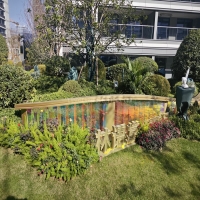Welcome to the website for landscape facilities products and knowledge.
Does polypropylene affect earthworm activity in a landscape tree box?
Polypropylene, a common synthetic polymer, is increasingly found in urban environments, including landscape tree boxes. These tree boxes, designed to support urban greenery, often contain mulch or other materials that may incorporate polypropylene fibers. But how does this material impact earthworm activity, a key indicator of soil health?
Earthworms play a vital role in soil aeration, nutrient cycling, and organic matter decomposition. Recent studies suggest that microplastics, including polypropylene, can alter soil structure and microbial communities. While direct research on polypropylene's effect on earthworms in tree boxes is limited, broader findings indicate potential risks. Polypropylene fibers may reduce earthworm burrowing efficiency or even cause physical harm if ingested.
In controlled experiments, earthworms exposed to polypropylene-rich soils showed reduced growth rates and avoidance behaviors. However, landscape tree boxes present a unique scenario—organic matter and moisture levels might mitigate some negative effects. Further research is needed to assess long-term impacts on urban ecosystems.
To minimize risks, consider using natural alternatives like jute or coconut coir in tree boxes. Monitoring earthworm populations can also serve as a practical gauge of soil health in polypropylene-exposed environments. By addressing this issue, urban planners can promote healthier, more sustainable green spaces.
Related search:

Recommendation
Metal and acrylic color-changing combined curtain wall for large-scale public landscape facilities